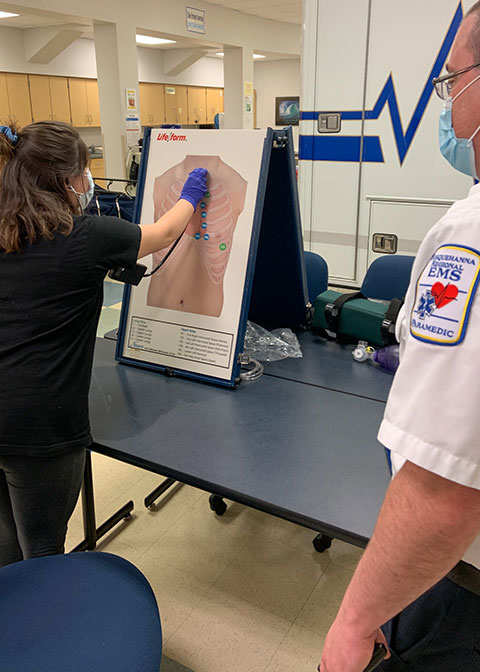PPL supports training for front-line health care workers
Published 04.16.2021
News
Nursing & Health Sciences
Alumni News
Corporate Relations
Penn College at Wellsboro
Workforce Development
Future health care professionals have access to a learning tool that simulates respiratory symptoms likely to be encountered in the field, thanks to a $2,500 sustaining grant from PPL Foundation to Pennsylvania College of Technology.
The 2020 contribution enabled purchase of a lung sounds simulator, which mimics real-life scenarios essential to educating health care providers.
“PPL is pleased to partner with Penn College to help enhance training for current and aspiring health care professionals,” said Tracie L. Witter, regional affairs director. “We appreciate the efforts of Penn College Workforce Development to help improve the skills of our community’s front-line workers.”
 Penn College at Wellsboro houses the simulator, but the equipment’s portability allows it to be shared with classes on main campus in Williamsport and at area hospitals used as education venues.
Penn College at Wellsboro houses the simulator, but the equipment’s portability allows it to be shared with classes on main campus in Williamsport and at area hospitals used as education venues.
“Students can learn to recognize different lung sounds, which will translate to easier recognition of those sounds in a live patient while completing their clinical experience,” said Jason P. Zielewicz, director of workforce development at the Wellsboro campus. “Or it may be the only time they hear a particular lung sound in school, and they will be able to recognize it later as a provider.”
The equipment uses a specialized stethoscope, which will only provide the desired sound when it is properly placed against the simulated torso. Students learning about asthma, for example – just one of the conditions from which an instructor can choose – can hear the wheezing normally associated with that condition. That allows them to react in real time to whatever the “patient” is experiencing.
“We are grateful to be awarded grant support from PPL,” said Elizabeth A. Biddle, director of corporate relations. “The partnership with PPL is invaluable to our students, who benefit greatly from support that enhances technology and helps Penn College stay on the cutting edge of training and education.”
Zielewicz anticipates that up to 70 students in the next year will benefit from the simulator – those learning to be licensed practical nurses, pre-hospital registered nurses, critical care providers, emergency medical technicians and responders, as well as participants in apprenticeship/preapprenticeship programs for EMTs and paramedics.
For more information about Penn College at Wellsboro, call 570-724-7703.
For more about the college, a national leader in applied technology education, email the Admissions Office or call toll-free 800-367-9222.
The 2020 contribution enabled purchase of a lung sounds simulator, which mimics real-life scenarios essential to educating health care providers.
“PPL is pleased to partner with Penn College to help enhance training for current and aspiring health care professionals,” said Tracie L. Witter, regional affairs director. “We appreciate the efforts of Penn College Workforce Development to help improve the skills of our community’s front-line workers.”
 Penn College at Wellsboro houses the simulator, but the equipment’s portability allows it to be shared with classes on main campus in Williamsport and at area hospitals used as education venues.
Penn College at Wellsboro houses the simulator, but the equipment’s portability allows it to be shared with classes on main campus in Williamsport and at area hospitals used as education venues.“Students can learn to recognize different lung sounds, which will translate to easier recognition of those sounds in a live patient while completing their clinical experience,” said Jason P. Zielewicz, director of workforce development at the Wellsboro campus. “Or it may be the only time they hear a particular lung sound in school, and they will be able to recognize it later as a provider.”
The equipment uses a specialized stethoscope, which will only provide the desired sound when it is properly placed against the simulated torso. Students learning about asthma, for example – just one of the conditions from which an instructor can choose – can hear the wheezing normally associated with that condition. That allows them to react in real time to whatever the “patient” is experiencing.
“We are grateful to be awarded grant support from PPL,” said Elizabeth A. Biddle, director of corporate relations. “The partnership with PPL is invaluable to our students, who benefit greatly from support that enhances technology and helps Penn College stay on the cutting edge of training and education.”
Zielewicz anticipates that up to 70 students in the next year will benefit from the simulator – those learning to be licensed practical nurses, pre-hospital registered nurses, critical care providers, emergency medical technicians and responders, as well as participants in apprenticeship/preapprenticeship programs for EMTs and paramedics.
For more information about Penn College at Wellsboro, call 570-724-7703.
For more about the college, a national leader in applied technology education, email the Admissions Office or call toll-free 800-367-9222.